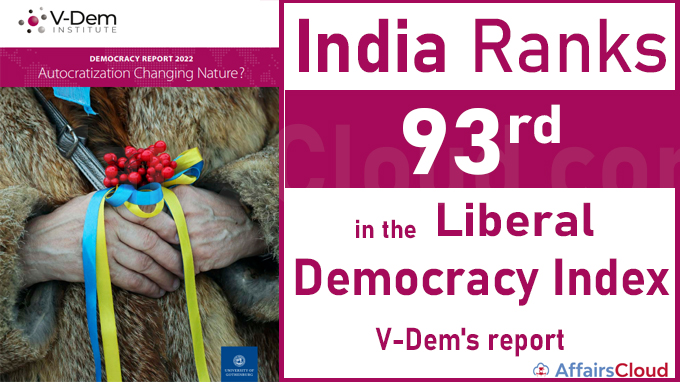 According to the Swedish based V-Dem (Varieties of Democracy) Institute report titled, ‘Democracy Report 2022: Autocratisation Changing Nature’, India has been ranked among the top ten autocratic countries in the world and has been ranked 93rd on the Liberal Democracy Index (LDI) out of 179 countries
According to the Swedish based V-Dem (Varieties of Democracy) Institute report titled, ‘Democracy Report 2022: Autocratisation Changing Nature’, India has been ranked among the top ten autocratic countries in the world and has been ranked 93rd on the Liberal Democracy Index (LDI) out of 179 countries
Rankings:
Top 5 LDI Countries – sweden , Denmark, Norway,Costa rica and new Zealand
Most autocratic countries – Afghanistan, Belarus, China, Russia, Saudi Arabia, Sudan, and Venezuela are among the most autocratic in the world.
India’s report:
i.India is one of the top ten ‘autocratisers’ in the world, which indicates that India is autocratic rather than a democracy that it can more suitably be indicated as electoral autocracy.
- India is in the bottom 40% to 50% of countries on V-Dem’s Liberal Democracy Index (LDI).
- In Democracy report 2020, the institute classified India as an electoral autocracy.
ii.It has slipped further down in the Electoral Democracy Index (EDI), to 100, and even lower in the Deliberative Component Index, at 102.
iii.India acquired 69th rank in liberal component index (LCI), 114th rank in Egalitarian component Index (ECI), 85th position in participatory component index (PCI) and 102nd position in deliberative component index (DCI).
iv.In South Asia, India is ranked below Sri Lanka (88), Nepal (71), and Bhutan (65) and above Pakistan (117) in the LDI.
From the report:
i.The level of democracy enjoyed by the average global citizens in 2021 is down to 1989 levels.
ii.The world is facing increasing dictatorships that reach up to 70% of the world population (i.e.) 5.4 billion people and also with a record of 33 countries autocratising.
- Autocratisation is spreading rapidly, Closed autocracies, or dictatorships, rose from 25 to 30 between 2020 and 2021.
iii.The democratic decline can be mainly seen in the regions of Asia Pacific, Eastern Europe and Central Asia, as well as in parts of Latin America and the Caribbean.
- The world has 89 democracies and 90 autocracies, electoral autocracy remains the most common regime type, accounting for 60 countries and 44% of the world population or 3.4 billion people.
About the report:
i.The LDI captures both liberal and electoral aspects of a democracy based on 71 indicators that comprises of,
- Liberal Component Index (LCI)- It indicates protection of individual liberties and legislative constraints on the executive.
- Electoral Democracy Index (EDI) – It considers free and fair elections such as freedom of expression and freedom of association.
- Egalitarian Component Index – This indicates, to what extent different social groups are equal.
- Participatory Component Index – This takes into account the health of citizen groups, civil society organisations.
- Deliberative Component Index – This ensures if the political decisions are taken through public reasoning that focuses on common good.
Major concerns:
i.The toxic polarisation is the greatest driver of autocratisation that mutually reinforce measures of polarisation of society, political polarisation, and political parties’ use of hate speech tend to systematically rise together to extreme levels.
- Repression of civil society and censorship of media were other concerns towards autocratic society.
ii.According to the report, the freedom of expression declined in 35 countries and repression of civil society organisations (CSOs) worsened in 44 countries over the past ten years.
- The direct government control over CSOs’ existence moved in an authoritarian direction in 37 countries
ii.The report also shows concerns on decisive autonomy for the electoral management body (EMB) that has deteriorated in 25 countries.
Recent related news:
The Economist Intelligence Unit (EIU) released its report titled ‘Democracy Index 2021’ across 165 independent countries and two territories (totally 167). India is ranked 46 on the global index with an overall score of 6.91.
About V-Dem Institute:
Establishment – 2014
Headquarters – Gothenburg, Sweden
Director – Staffan I. Lindberg




